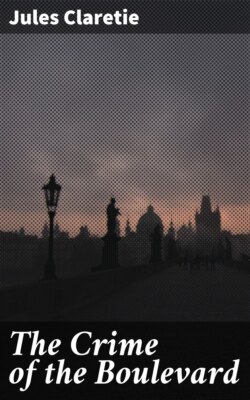Читать книгу The Crime of the Boulevard - Jules Claretie - Страница 8
На сайте Литреса книга снята с продажи.
CHAPTER VI.
ОглавлениеTable of Contents
The attorney for the Republic called in the Examining Magistrate. Nothing more was to be done. The Magistrate had studied the position of the corpse, examined the wound, and now, having told M. Ginory his impressions, he did not hide from him his belief that the crime had been committed by a professional, as the stroke of the knife across the throat had been given neatly, scientifically, according to all the established rules.
"One might well take it for the work of a professional butcher."
"Yes, without doubt, M. Ginory; but one does not know. Brute force—a strong blow—can produce exactly what science can."
More agitated than he wished to appear by the strange conversation between the Agent of Sureté and himself, the Examining Magistrate stood at the foot of the corpse and gazed, with a fixity almost fierce, not at the gaping wound of which M. Jacquelin des Audrays had spoken to him, but at those eyes,—those fixed eyes, those eyes which no opacity had yet invaded, which, open, frightful, seemingly burning with anger, menacing, full of accusations of some sort and animated with vengeance, gave him a look, immovable, most powerful.
It was true! it was true! They lived! those eyes spoke. They cried to him for justice. They retained the expression of some atrocious vision: the expression of violent rage. They menaced some one—who? If the picture of some one was graven there, was it not the last image reflected on the little mirror of the retina? What if a face was reflected there! What if it was still retained in the depths of those wide-open eyes! That strange creature, Bernardet, half crazy, enthused with new ideas, with the mysteries which traverse chimerical brains, troubled him—Ginory, a man of statistics and of facts.
But truly those dead eyes seemed to appeal, to speak, to designate some one. What more eloquent, what more terrible witness could there be than the dead man himself, if it was possible for his eyes to speak; if that organ of life should contain, shut up within it, preserved, the secret of death? Bernardet, whose eyes never left the magistrate's face, ought to have been content, for it plainly expressed doubt, a hesitation, and the police officer heard him cursing under his breath.
"Folly! Stupidity! Bah! we shall see!"
Bernardet was filled with hope. M. Ginory, the Examining Magistrate, was, moreover, convinced that, for the present, and the sooner the better, the corpse should be sent to the Morgue. There, only, could a thorough and scientific examination be made. The reporter listened intently to the conversation, and Mme. Moniche clasped her hands, more and more agonized by that word Morgue, which, among the people, produces the same terror that that other word, which means, however, careful attendance, scientific treatment and safety,—hospital, does.
Nothing was now to be done except to question some of the neighbors and to take a sketch of the salon. Bernardet said to the Magistrate: "My photograph will give you that!" While some one went out to get a hearse, the Magistrates went away, the police officer placed a guard in front of the house. The crowd was constantly increasing and becoming more and more curious, violently excited and eager to see the spectacle—the murdered man borne from his home.
Bernardet did not allow M. Ginory to go away without asking respectfully if he would be allowed to photograph the dead man's eye. Without giving him a formal answer, M. Ginory simply told him to be present at the autopsy at the Morgue. Evidently if the Magistrate had not been already full of doubt his reply would have been different. Why did that inferior officer have the audacity to give his opinion on the subject of conducting a judicial investigation? M. Ginory would long before this have sent him about his business if he had not become suddenly interested in him. In his quality of Judge he had come to know Bernardet's history and his exploits in the service. No more capable man, in his line, could be found. He was perfectly and utterly devoted to his profession. Some strange tales were told of his methods. It was he who once passed an entire night on a bench, pretending intoxication, in order to gain sufficient information to enable him to arrest a murderer in the morning in a wretched hovel at La Vilette—a murderer armed to the teeth. It was Bernardet who, without arms—as all those agents—caught the famous bandit, the noted Taureau de la Glacière, a foreign Hercules, who had strangled his mistress. Bernardet arrested him by holding to his temple the cold neck of a bottle and saying, "Hands up or I fire!" Now what the bandit took for the cold muzzle of a pistol was a vial containing some medicine which Bernardet had purchased of a pharmacist for his liver.
Deeds of valor against thieves, malefactors and insurrectionists abounded in Bernardet's life; and M. Ginory had just discovered in this man, whom he believed simply endowed with the activity and keenness of a hunting dog, an intelligence singularly watchful, deep and complicated. Bernardet, who had nothing more to do until the body should be taken to the Morgue, left the house directly after the Magistrates.
"Where are you going?" asked Paul Rodier, the reporter.
"Home. A few steps from here."
"May I go along with you?" asked the journalist.
"To find an occasion to make me speak? But I know nothing! I suspect nothing; I shall say nothing!"
"Do you believe that it is the work of a thief, or revenge?"
"I am certain that it was no thief. Nothing in the apartment was touched. As for the rest, who knows?"
